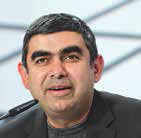Issue No.15 / October 1-15,2015

The corporate world stood up and took notice when technology giant Infosys, in a groundbreaking move, did away with the formal dress code for its employees. Employees can now wear T-shirts and jeans all week long, as opposed to one day a week in most other technology companies, or none at all as is the norm in other corporate sectors. Most employees were ecstatic, as their repeated requests finally yielded this result. But what does this move spell for the future of the formal dress code? Will the effect of this move be felt across the IT sector (and even spill over to other verticals), or will this just remain a one-off exception to the norm? Corporate Citizen reached out to corporates to get their views on the subject

“You can now flaunt your smart business casuals all week long! Your favourite pair of jeans teamed with that T-shirt you love can now be worn every day, going forward. This was a change that many of you had voiced and requested on various platforms, so we are really excited that it is official now! We believe that each of you is empowered to make the right decision and dress in a way that will make Infosys proud.”

“I basically wear just a T-shirt and jeans to work. I really want to clear my life so that I have to make as few decisions as possible about anything except how to best serve this community. I feel like I’m not doing my job if I spend any of my energy on things that are silly or frivolous about my life, like dressing up for work, so that way I can dedicate all of my energy towards just building the best products and services.”

“I have always hated ties, maybe because I’ve never seen the point. They are uncomfortable and serve no useful purpose. Suits and ties in an office are just another type of uniform, but have no role in an arena where uniforms no longer serve any useful purpose. At one time they probably showed that the wearer was. Now, however, in an individualised, interconnected culture, your achievements speak for themselves. The suit and tie is an anachronism.”

“We’ve been thinking of instituting a relaxation in our dress code for some time now. Employees need to feel comfortable in what they’re wearing in order to be at their most productive. This change is part of our recent brand transformation, — ‘Never Stand Still’ — to deepen our engagement with millennials in India. Lenovo trusts its employees to be appropriately attired within the parameters of business casuals. No longer will ties and formal suits be advocated, but we won’t encourage shorts and flip-flops either. It’s a good idea to put employees through group sessions before instituting such changes to help them understand the nuances of business casuals and to help define what works and what doesn’t. Sloppiness in attire, if allowed to creep in, can affect the mood at the workplace.”

“I believe in that in today’s fast paced tech world, performance outranks appearance, and Infosys has understood that. Organisations cannot be rigid anymore. They have to learn to be liberal. What matters most is that employees feel like they belong to the organisation and they are made to feel comfortable. In the technology sector, people often work long hours for days on end. They shouldn’t be additionally burdened by dress codes. A happy employee translates into better performance and growth for the company. It is in everyone’s best interest to encourage an informal dress code at work.”

“We have always had an informal dress code at our office. Informal dress codes have always been the norm in Silicon Valley, where all the major tech corporations are located. I believe that the last thing an employee should be worried about is whether his tie matches his shirt colour. I can understand sales and marketing people being required to have a formal dress code, as they have to meet clients on a regular basis. Techies don’t have the same requirement. It is completely unnecessary for them to have a formal dress code at work.’
By Neeraj Varty